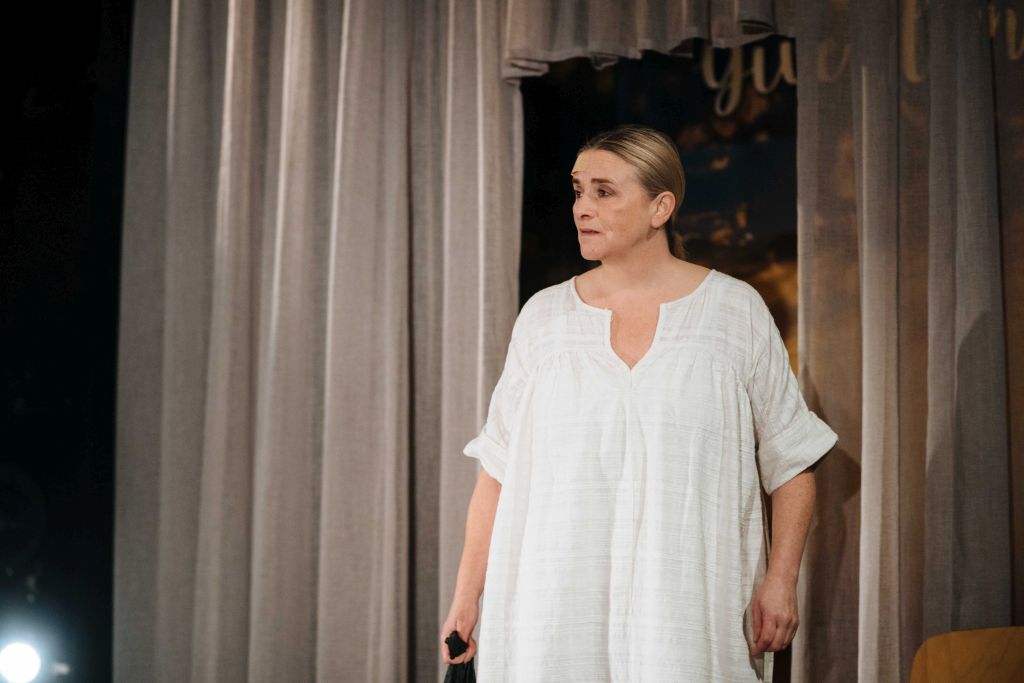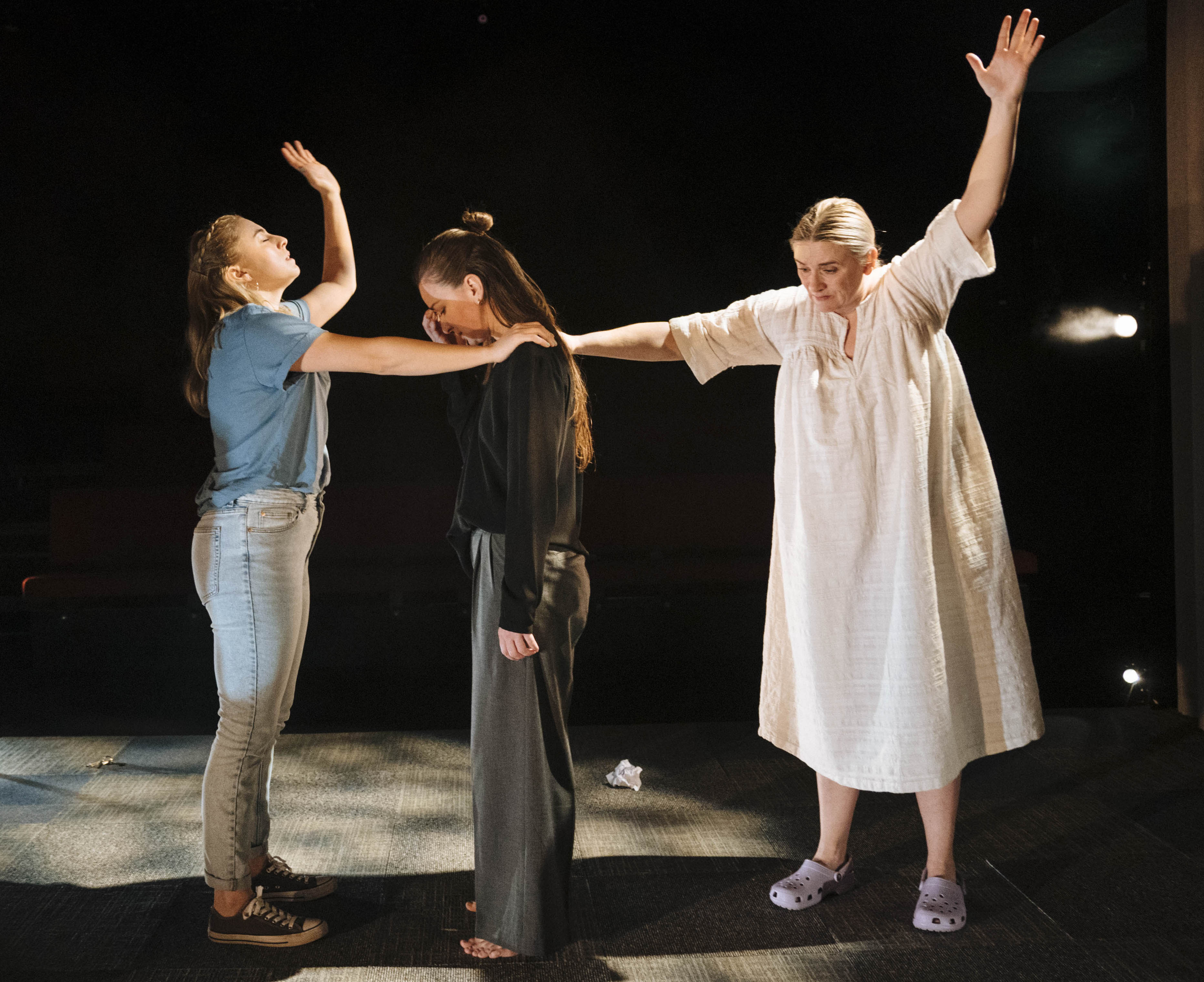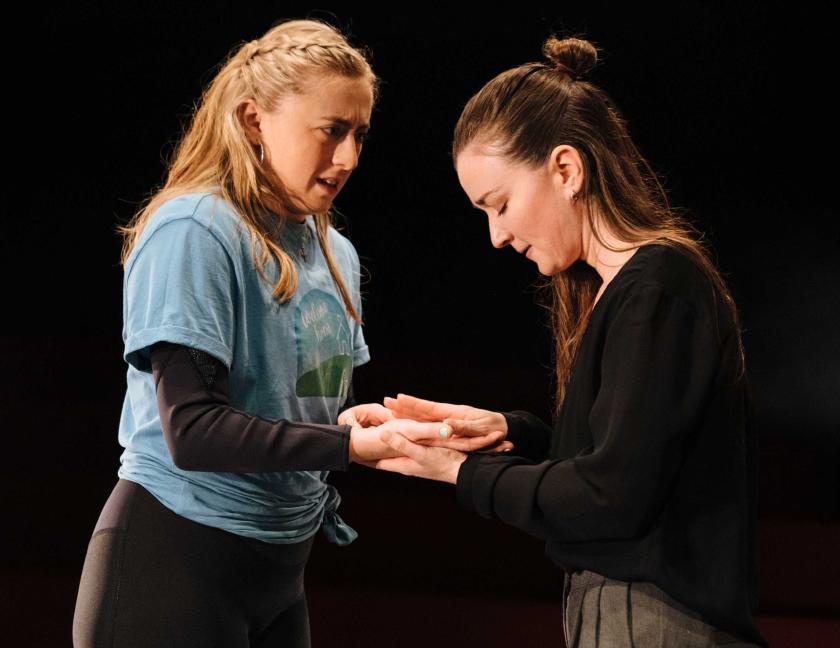Michael John O’Neill’s first full-length play, premiering at the Hampstead's studio space downstairs, is a puzzler. There’s the title, to start with, a Hebrew word that means “binding” and is a reference to the story of Abraham preparing his son Isaac, at God’s command, to be sacrificed.
Spotting the reworking of this biblical theme in the text can be a challenge, even though O’Neill usefully has one of the characters treasure her toy lamb, Deadsheep, as a clue. The religion that features here, too, isn’t Judaism but a cultish kind of Pentecostalism, including speaking in tongues, led by a senior pastor called Richard. At his base on the northern Irish coast – ominously called Harvest, with its connotations of organ gathering – he has a devoted follower in 18-year-old Kelly (Ruby Campbell), who has been there two years and has just performed her first in-sea baptism.
Kelly isn’t the first character we meet, though. Her older sister Gillian (Amy Molloy) is behind thick net curtains as the house lights go down and a rumbling noise crescendoes. She is in a trance-like state, muttering to herself, lashing out at unseen combatants: a condition she falls into regularly throughout and is termed by Kelly “losing time”, and by O’Neill’s stage directions as a “dwam”.
 Kelly arrives to open the curtains, both literally and metaphorically. Slowly, very slowly, her dialogue with Gillian starts to give the puzzle of the plot some semblance of a shape. In fragments, we learn that the sisters have been separated ever since their mother took off from the family home with young Kelly and left her in a house where the police could find her. Kelly was then passed on to social services and a foster mother; Gillian was left with Daddy, a bruiser who used his wife as a groomer of young girls, handing the role on to Gillian. He has since died of a heart attack she could have sought help for, but didn’t.
Kelly arrives to open the curtains, both literally and metaphorically. Slowly, very slowly, her dialogue with Gillian starts to give the puzzle of the plot some semblance of a shape. In fragments, we learn that the sisters have been separated ever since their mother took off from the family home with young Kelly and left her in a house where the police could find her. Kelly was then passed on to social services and a foster mother; Gillian was left with Daddy, a bruiser who used his wife as a groomer of young girls, handing the role on to Gillian. He has since died of a heart attack she could have sought help for, but didn’t.
The text is delicate in its description of this set-up. Daddy was a “bad man” who “did things”, Kelly says, and he also had paramilitary connections, though Gillian dismisses that idea as mere swagger. The battle lines are fairly clear: Gillian hated her "hoor" of a mother for leaving, Kelly is much more sympathetic to her, seeing her as a victim of their father.
But what are Gillian's dwams? Psychotic episodes? Or literary devices for digging up the past? What was the voice she said made her come to find Kelly? It's never clear.
The plot heads towards a resolution of sorts, but it’s tough going. The two leads (who don’t look 15 years apart in age) latch onto what they can in the text, Gillian majoring in a robust, sarcastic humour, Kelly in sunny evangelicism. But despite director Lucy Morrison's best efforts, the play doesn't draw the audience wholeheartedly in. We are on the periphery, teasing out what is happening and what has already happened. The language is mostly idiomatic, though O’Neill launches into a more lyrical flow when Gillian is in one of her dwams or Kelly is fighting her way through the platitudinous script her spiritual “home” has taught her, towards a kind of clarity.
Kelly’s sententiously delivered notions about God’s purpose are clearly a comfort to her and have given her existence a structure. But they are dramatically inert, a stream of learnt cliches. Gillian enlivens them by retaliating with some acerbic humour (Molloy excels here), but they keep on coming. When Kelly tries to explain that Harvest uses a healing process composed of seven modules, for example, Gillian unleashes her contempt: “Please, please tell me you have a certificate in talking shite... Have you had it framed?”  But the action is claustrophobically contained to just the two women, plus a third (Mairead McKinley, pictured top and above, with Campbell and Molloy) late in the play, and has the same rhythm until it's almost at an end: Kelly pursues her goal of getting Gillian to join her at Harvest; Gillian stoutly resists. All the while, this to and fro is punctuated by the constant pinging and buzzing of Kelly’s phone, a reminder of Richard’s presence as a moderator – or worse? – of what she is doing. Only a rather implausible reveal in the final stages unblocks the impasse.
But the action is claustrophobically contained to just the two women, plus a third (Mairead McKinley, pictured top and above, with Campbell and Molloy) late in the play, and has the same rhythm until it's almost at an end: Kelly pursues her goal of getting Gillian to join her at Harvest; Gillian stoutly resists. All the while, this to and fro is punctuated by the constant pinging and buzzing of Kelly’s phone, a reminder of Richard’s presence as a moderator – or worse? – of what she is doing. Only a rather implausible reveal in the final stages unblocks the impasse.
Reading the script after the performance, I was immediately struck by its literariness. Even the stage directions reach odd heights of abstraction. The first one calls for the opening to express: “The vastness of space. The noise of everything.” By the last scene, this noise has to be turned up “so loud, we might not be able to hear them [Gillian and Kelly]”. Well done to sound designer Beth Duke for tackling that one so well.
These directions echo the play’s loftier, trickier ambitions. O’Neill does not want to take sides in the sisters’ battle to claim primacy for their vision of “home”: Gillian’s self-sufficient solitariness versus Kelly’s supportive community. Fair enough, but this even-handedness doesn’t leave matters on an emotional high. The women’s stories are sad, almost tragic, but ultimately they don’t prompt tears so much as a scratch of the head.















Add comment